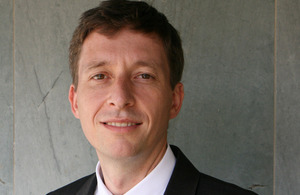The UK and the OECD
Keep up to date with how the UK and the OECD are working together to promote 'better policies for better lives' by following Nick's blog

Ambassador Nick Bridge
Nick Bridge, UK Permanent Representative and Ambassador to the Organisation for Economic Cooperation and Development (OECD), blogs regularly about UK work at the OECD and how together we are seeking to promote ‘better policies for better lives’. You can have a look at Nick’s blog here.
The UK and the OECD working together
Video introduction to the UK and the OECD
Nick’s first video blog gives an insight into what the OECD does and the role of the UK Delegation. Have a look to find out a bit more about our top priorities as a Delegation, and how we’re working with the OECD.
Transcript of Nick’s video blog
I’m Nick Bridge, the British Ambassador to the Organisation for Economic Co-operation and Development (OECD), based here in Paris. It’s an international organisation of 34 members: the UK and most other members of the EU, but also other countries like the US, Canada, Mexico, Chile, Korea, Japan, Australia, New Zealand. But the organisation doesn’t just work with its Members; it has relationships with over 100 other countries around the world, particularly the big emerging economies: China, India, Brazil, Indonesia, South Africa.
What does the OECD do? Well the strap line is ‘better policies for better lives’ and what that means in practice is that we’re looking to find ways to develop our economies more sustainably, in a more inclusive way and in a more job rich way. All around the world, we’re suffering from the economic and financial crisis and the OECD is about getting together as Members and working out new and better approaches to solving these problems.
How does it do its work? There are two main ways. One is the huge collection of data and analysis in order to design better policies. So everybody gets together from countries and they meet at the OECD with the professional OECD staff – economists, statisticians and social scientists – to design better policies based on the best available evidence. The second way is a soft power approach which is to try and establish guidelines and rules and ways of operating in this globalising world. So we think about how to establish rules of competition or investment, to prevent bribery or corruption all around the world in a way that will help us work on a level playing field and become more prosperous together.
What are the UK’s main interests at the OECD? Well, we support the organisation across all fields but I think we have invested particular interest in recent times in looking at these new approaches to economic challenges. So for example a more sustainable approach that recognises the challenge of climate change and the need to provide cleaner and more sustainable energy for our economies. We also need to become be more inclusive, as the UK has become rather unequal, and we need to find ways to distribute our wealth better and also create more jobs. The OECD also works across the range of social policies, in designing our Universal Credit, in thinking about our education and health reforms.
We’ve also got the Development Committee here which is the place that decides whether a country is spending enough on overseas aid – the 0.7 per cent of GDP - that’s decided at the OECD.
So how do we do our work? Well, I head a small team here that works on behalf of the UK, mainly in two ways. We make sure that all the interests of the UK Government are brought to the OECD and are worked on and prioritised. But also the other direction – we’re here to make sure that this great analysis and policy advice gets back into the UK system, into Government, think tanks and academia and can help us prosper in our 21st Century economy.